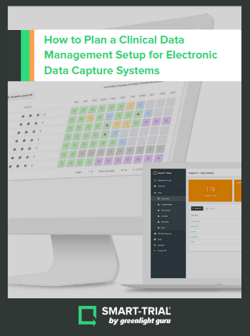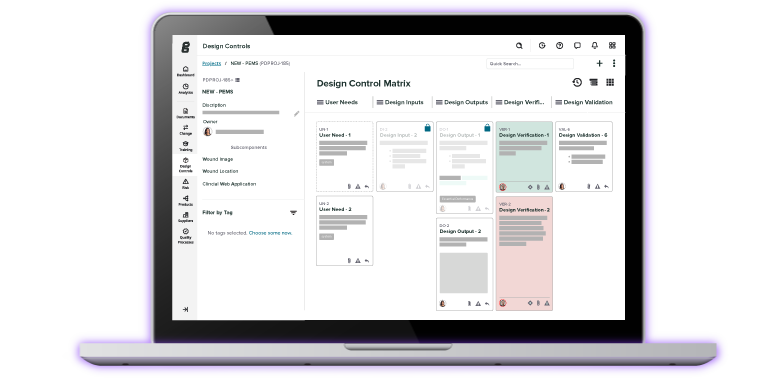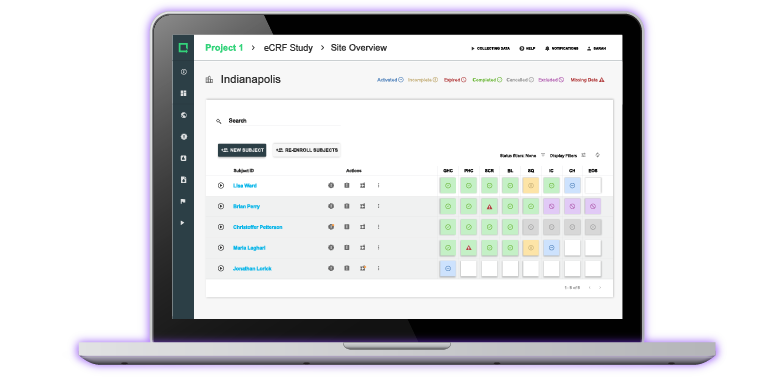How Electronic Data Capture is Transforming the MedTech Industry
.png?width=800&height=400&name=How%20Electronic%20Data%20Capture%20is%20Transforming%20the%20MedTech%20Industry%20(new).png)
Though MedTech is already among the fastest-evolving markets in the world, it doesn’t mean it couldn’t still benefit from a spark of innovation.
Electronic data capture (EDC) solutions have the potential to revolutionize the clinical trial data collection and management process. By providing a secure, efficient, and user-friendly platform for collecting and managing clinical trial data, modern EDC solutions are helping to improve data quality, reduce errors, and enhance the overall efficiency of the clinical trial process.
Let’s take a look at the current state of clinical operations in MedTech and ways EDC technology can help transform the medical device industry.
Current challenges of clinical operations for MedTech Companies
We should start with an understanding of the current state of clinical operations for medical devices. There are quite a few challenges that are unique to the MedTech industry, particularly when it comes to the way clinical data is utilized, both to comply with device regulations and to gain insights into device functionality and effectiveness.
Let’s take a look at four significant challenges of clinical operations for MedTech companies.
MedTech clinical operations are different
Device studies are often small and require various data that is normally not collected around drugs, because the way you apply devices in clinical practice is often by someone interacting with them.
Clinical data can be gathered for medical devices in many different ways, and even by different individuals, such as:
- Healthcare providers
- Physicians
- Investigators
- Patients
Changes in regulatory focus
Whoever said the only constant is change must have been referring to the world of medical device regulations. Staying up to date with compliance is a major point of concern for clinical operations in MedTech, both for pre-and-post market studies.
EU’s implementation of MDR and IVDR continue to evolve, and the US market has increased its focus on clinical data with regulatory shifts by the FDA. As a result, there’s been a significant impact on the amount and quality of clinical data needed for market access—not to mention the data required to keep the device on the market.
Value-based market shift
Standing out in a crowd of predicate devices is never an easy task. But with the current market’s move to value-based care, buyers are now looking to manufacturers to provide some documentation or justification on why one should select one device over another. That means being able to produce the clinical data required to make the choice between one device over another is crucial.
There are also big-time needs for data security and centralization, particularly with the need for compliance with 21 CFR Part 11, which requires any patient data or electronic signatures to be stored securely. Any false steps here could lead to customers choosing a different device manufacturer.
Outdated clinical data collection methods
Traditional methods such as paper-based forms, manual entry of data into databases, and spreadsheets are prone to human error and inefficiency. These methods are often slow and time-consuming, leading to long wait times for patients and decreased productivity for healthcare providers.
The lack of accuracy and consistency in the data collected through these methods also leads to errors in diagnosis, treatment plans, and patient outcomes. Even worse, traditional methods have limited data analysis capabilities, which makes it difficult for healthcare providers to gain insights into patient health, identify trends, and make informed decisions about patient care.
EDC systems help the MedTech world work differently
The digital transformation of clinical operations in MedTech has been made possible almost entirely by EDC systems. And while software tools have been around for quite some time, it’s a good idea to break down exactly how an EDC solution like Greenlight Guru Clinical (formerly known as SMART-TRIAL) works to increase efficiency and quality in clinical data collection.
In plain words, EDC systems digitally collect, store, and manage patient data collected during clinical investigations. They also allow the sponsor of a clinical study to create customized electronic Case Report Forms (eCRFs) that can be completed by the researchers performing the study.
These forms are designed to capture essential information about the patients and their health status, which is critical for analyzing the effectiveness of a new or existing medical device.
Greenlight Guru Clinical includes a whole suite of features that make it an industry-leading EDC, including:
- eCFR Builder
- Electronic Patient Reported Outcomes (ePRO)
- Electronic Clinical Outcome Assessment (eCOA)
- Adverse Events Reporting Module
- eConsent
- Randomization
- Integration options via application programming interfaces (APIs)
- Case-based Data Collection
- Survey Data Collection
One of the key benefits of EDC systems is their ability to validate user inputs. Data managers can configure and program the EDC software to validate inputs, ensuring that any data collected is both accurate and complete. This reduces the risk of errors in data collection, which can have serious consequences for the success of a clinical study.
Finally, once sufficient data has been collected, electronic data capture software allows clinical study managers to export the data to external tools for analysis. They also provide documentation of all regulatory-required evidence that a device is both safe and effective.
Benefits of leveraging MedTech-specific EDC systems
With so many advantages to outdated forms of clinical data collection, choosing an EDC solution should seem like a no-brainer. However, it’s easy for even the most seasoned medical device pros to overlook the benefits that come with leveraging MedTech-specific EDC systems.
For starters, EDC systems have streamlined the data collection process. With automatic transmission of clinical data from PRO instruments and medical devices, as well as real-time monitoring, EDC systems allow researchers to create the data in a digital format with an eCRF.
Once an eCRF has been completed by researchers and saved in your EDC system, it can be accessed immediately from anywhere in the world with an Internet connection by anyone with the appropriate authorization. Now, instead of waiting for a box of paper CRF forms to arrive by mail, data reviewers can start reviewing and analyzing eCRF data just moments after it has been created. This real-time access to data makes it easier for clinical trial managers to detect trends and make well-informed decisions.
EDC systems can also drastically improve data quality, incorporating software-based mechanisms for improving data quality that cut down on the possibility for errors in data entry and transcription. As a result, researchers now have the opportunity to correct data entry mistakes and discrepancies before they can influence the outcome of the study.
Additionally, EDC systems have enhanced data authenticity and security. Paper-based CRFs can easily be lost, stolen, or damaged, while eCRFs created in a software EDC system are immediately uploaded to secure cloud storage. EDC systems can also incorporate security features, such as role-based access controls (RBAC), multi-factor authentication, and more, to ensure that only authorized persons may access the data.
Finally, EDC systems have allowed MedTech companies to save in clinical operations costs by streamlining the data collection process, leveraging automation to ensure high-quality data, and reducing the need for data cleaning and preparation. The ability to execute clinical studies more quickly means that medical device companies can fast-track their pathway to market authorization and start realizing profits even sooner than expected.
How Greenlight Guru Clinical is revolutionizing EDC solutions for MedTech
If you say you want a revolution, Greenlight Guru Clinical is here to lend a hand. Whether you’re gathering data in clinical studies, performance studies, PMCF/PMPF studies, surveys, registries, cohorts, or case series, our Electronic Data Capture solution allows you to collect and manage it all with ease. Even better, it comes fully validated out of the box per ISO 14155:2020.
Join the revolution, and contact us today for your Greenlight Guru Clinical!
Páll Jóhannesson, M.Sc. in Medical Market Access, was the founder and former CEO of Greenlight Guru Clinical (formerly SMART-TRIAL) and is currently the EVP of Europe at Greenlight Guru.
Read More Posts
Clinical Trials in 2025: The Outlook for Medical Device Companies
What’s New in Greenlight Guru Clinical 2025.1: Smarter Show Rules and Easier File Vault Access
The Biggest Quality Challenges for Medical Device Companies in 2025
Get your free eBook PDF
How to Plan a Clinical Data Management Setup for EDC Systems


.png?width=2318&name=How%20to%20Plan%20a%20Clinical%20Data%20Management%20Setup%20for%20EDC%20Systems%20(new).png)







